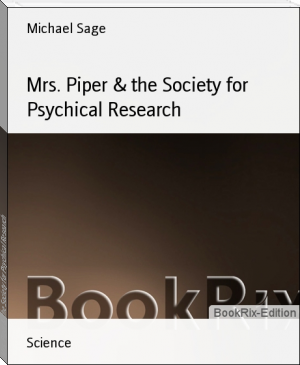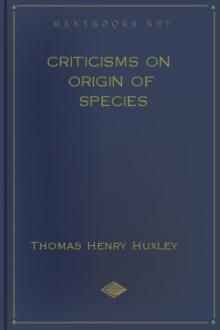Mrs. Piper & the Society for Psychical Research - Michael Sage (e book reader free TXT) 📗

- Author: Michael Sage
Book online «Mrs. Piper & the Society for Psychical Research - Michael Sage (e book reader free TXT) 📗». Author Michael Sage
PUBLISHER'S NOTE
It is obvious that such a body of men, pledged to impartial investigation, as the Society for Psychical Research could not officially stand sponsor to the speculative comments of M. Sage, however admittedly clear-sighted and philosophical that French critic may be.
But the publication of this translation has been actually desired and encouraged by many individuals in the Society, it has been revised throughout by a member of their Council, and it is introduced to the general reader by their President.
The Society, indeed, is prepared to accept M. Sage's volume as a faithful and convenient résumé of experiments conducted under its own auspices, and so far as it contains statements of fact, these statements are quoted from authoritative sources. For the comments, deductions or criticisms therein contained, the acute intellect of M. Sage is alone responsible.
It remains only to state in detail the principles on which the original text has been "slightly abridged" by the translator. No facts or comments have been left out that bear directly on the main subject of the book, the omissions are wholly of matters which might be regarded as superfluous for the understanding of the case of Mrs Piper. Occasionally paragraphs have been condensed, a tendency to vague theorising has been checked throughout, and certain irrelevant matter has been altogether omitted. Such omissions are confined, indeed, to single sentences or paragraphs, with only the exception of a somewhat technical discussion of the Cartesian philosophy in Chapter XVII. It had at first been intended to omit the whole of Chapter XI., as containing only fanciful and non-evidential matter; but statements of this kind form an integral part of the communications, and so, on the whole, it was thought fairer to retain M. Sage's chapter on the subject, especially as it may be found of popular interest.
The original appendix has been incorporated, after modifications, in Chapter XII., since the incident here discussed was in progress as M. Sage wrote and has since been closed. His conjectures as to its possible development are naturally omitted. Finally all references to the
Proceedings (or printed reports) of the Society itself have been carefully verified. In every case the words of the reports themselves are given in preference to any re-rendering of M. Sage's translations.
CONTENTS
Preface by Sir Oliver Lodge
Objects of the Society
Chapter I
Mrs Piper's mediumship - Is mediumship a neurosis?
Chapter II
Dr Richard Hodgson - Description of the trance - Mrs Piper not a good hypnotic subject.
Chapter III
Early trances - Careful first observations by Professor William James of Harvard University, Massachusetts, U.S.A.
Chapter IV
The hypothesis of fraud - The hypothesis of muscle-reading - "Influence."
Chapter V
A sitting with Mrs Piper - The hypothesis of thought-transference - Incidents.
Chapter VI
Phinuit - His probable origin - His character - What he says of himself - His French - His medical diagnosis - Is he merely a secondary personality of Mrs Piper?
Chapter VII
Miss Hannah Wild's letter - The first text given by Phinuit - Mrs Blodgett's sitting - Thought-reading explains the case.
Chapter VIII
Communications from persons having suffered in their mental faculties - Unexpected communications from unknown persons - The respect due to the communicators - Predictions - Communications from children.
Chapter IX
Further consideration of the difficulties of the problem - George Pelham - Development of the automatic writing.
Chapter X
How George Pelham has proved his identity - He recognises his friends and alludes to their opinions - He recognises objects which have belonged to him - Asks that certain things should be done for him - Very rarely makes an erroneous statement.
Chapter XI
George Pelham's philosophy - The nature of the soul - The first moments after death - Life in the next world - George Pelham contradicts Stainton Moses - Space and time in the next world - How spirits see us - Means of communication.
Chapter XII
William Stainton Moses - What George Pelham thinks of him - How Imperator and his assistants have replaced Phinuit.
Chapter XIII
Professor Hyslop and the journalists - The so-called "confession" of Mrs Piper - Precautions taken by Professor Hyslop during his experiments - Impressions of the sittings.
Chapter XIV
The communications of Mr Robert Hyslop - Peculiar expressions - Incidents.
Chapter XV
The "influence" again - Other incidents - Statistics.
Chapter XVI
Examination of the telepathic hypothesis - Some arguments which render its acceptance difficult.
Chapter XVII
Some considerations which strongly support the spiritualistic hypothesis - Consciousness and character remain unchanged - Dramatic play - Errors and confusions.
Chapter XVIII
Difficulties and objections - The identity of Imperator - Vision at a distance - Triviality of the messages - Spiritualist philosophy - Life in the other world.
Chapter XIX
The medium's return to normal life - Speeches made while the medium seems to hover between the two worlds.
Chapter XX
Encouraging results obtained - The problem must be solved.
PREFACE
BY THE
President of the Society for Psychical Research
One of the facts which by general consent in the present stage of psychological science require study is the nature, and if possible the cause, of a special lucidity, a sensitiveness of perception, or accessibility to ideas appearing to arrive through channels other than usual organs of sense, which is sometimes met with among simple people[1] in a rudimentary form, and in a more developed form in certain exceptional individuals. This lucidity may perhaps be regarded as a modification or an exaggeration of the clearness of apprehension occasionally experienced by ordinary persons while immersed in a brown study, or while in the act of waking out of sleep, or when self-consciousness is for a time happily suspended.
In men of genius the phenomenon occurs in the most dignified form at present known to us, and with them also it accompanies a lapse of ordinary consciousness, at least to the extent that circumstances of time and place and daily life become insignificant and trivial, or even temporarily non-existent; but the notable thing is that a few persons, not of genius at all, are liable to an access of something not altogether dissimilar, and exhibit a kind of lucidity or clairvoyant perceptivity, which, though doubtless of a lower grade, is of a well-defined and readily-investigated type, during that state of complete lapse of consciousness known to us as a specific variety of trance.
Not that all trance patients are lucid, any more than all brown studies result in brilliant ideas; nor should it be claimed that some measure of lucidity, even of the ultra-normal kind now under consideration, cannot exist without complete bodily trance. The phenomenon called "automatic writing" is an instance to the contrary, - when a hand liberated from ordinary conscious control is found, automatically as it were, to be writing sentences, sometimes beyond the knowledge of the person to whom the hand belongs. Some approach to unconsciousness, however, either general or local, seems essential to the access of the state, and such conditions as ordinarily induce reverie or sleep are suitable for bringing it on; no one, for instance, would expect to experience it while urgently occupied in affairs. Whether it is desirable to give way to so unpractical an attitude, and to encourage the influx of ideas through non-sensory channels, is another question which need not now concern us. It suffices for us that the phenomenon exists, and that it occasionally though very rarely takes on so well marked and persistent a form as to lend itself to experimental investigation. It is true that in these cases nothing of exceptional and world-compelling merit is produced; the substance of the communication is often, though not always, commonplace, and the form sometimes grotesque. It is true also that a complete record of a conversation held under these circumstances - perhaps a full record of a commonplace conversation held under any circumstances - readily lends itself to cheap ridicule; nevertheless, the evidence of intimate knowledge thus displayed becomes often of extreme interest to the few persons for whom the disjointed utterances have a personal meaning, although to the outsider they must appear dull, unless he is of opinion that they help him to interpret the more obscure workings of the human mind, or unless he thinks it possible that the nature and meaning of inspiration in general may become better understood by a study of this, its lowest, but at the same time its most definite and controllable, form. Undoubtedly information is attainable under these conditions from sources unknown, undoubtedly the entranced or semi-conscious body or part of a body has become a vehicle or medium for ostensible messages from other intelligences, or for impersonations; but the cause of the lucidity so exhibited, the nature of the channel by which the information is obtained, and the source of the information itself, are questions which, although they are apt to be treated glibly by a superficial critic, to whom they appear the most salient feature and the easiest of explanation, are really the most difficult of all.
It was to study such questions as this that a special society - the Society for Psychical Research - was founded some twenty-two years ago.
Perhaps the most remarkable, and certainly the most thorough, of all the investigations made under the auspices of this Society has been the case of the American lady, Mrs Piper; which, begun in 1887, has continued ever since, with only such intervals as were necessitated by the circumstances of the case. She was already known to the Professor of Psychology at Harvard and to some other American savants, but she was brought to the notice of the leaders of the English Society by Dr Richard Hodgson, who has been for some years, and is still, acting as its representative in America, and Secretary of its American Branch. A complete record of the whole investigation has not yet been published, but large portions of it have appeared from time to time in the Proceedings of the Society.
It is not to be supposed that the case is unique by any means; on the contrary, it may in some senses be regarded as typical, but its features are exceptionally well-marked, and the record has been more carefully and continuously kept than that of any other case. Accordingly, some emphasis has been given to it, and a general vague notion concerning the case has diffused itself among educated persons beyond the limits of the Society.
And indeed it is one of really general interest, since the hypothesis of fraud is entirely inapplicable to it, and in the opinion of the most sceptical critics who have made an adequate study of the case, no explanation more commonplace than that of telepathy will bear examination. Other critics - and these are they who have gone into the matter most thoroughly - find the hypothesis of telepathy to be insufficient, and hold that some further explanation is necessary. Opinions differ as to what that further explanation may be, and so far as I know it has not been scientifically formulated as yet. To me it appears probable that no one explanation will





Comments (0)